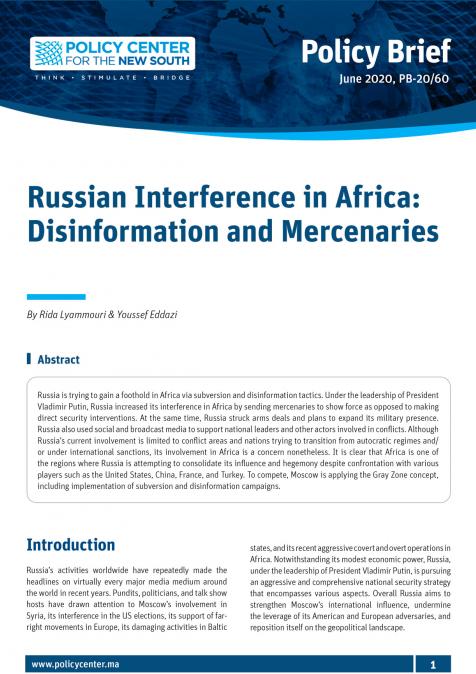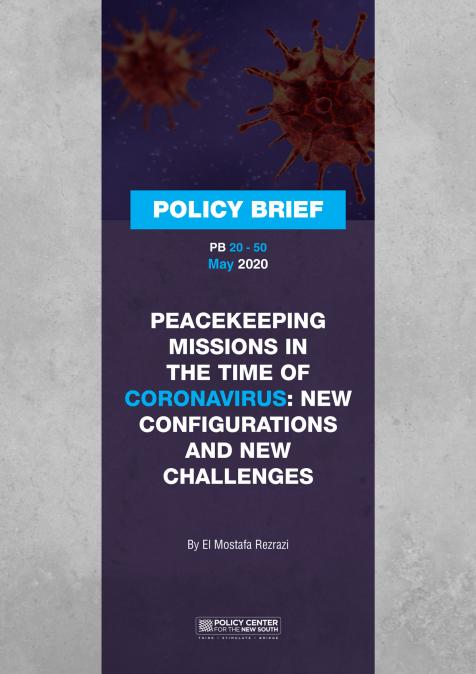This episode explores the evolving African defense strategies in response to emerging security threats. We discuss the shift toward regional cooperation, modernization of military capabilities, and integration of technology. The conversation highlights the role of governance, economic resilience, and diplomacy in sustaining security. It underscores Africa’s push for self-reliance and strategic autonomy in defense policy.
RELATED CONTENT
-
AuthorsAmine Harastani MadaniJuly 29, 2020Parler de de l’Union africaine sans évoquer la place qu’y occupe le Maroc serait incomplet, car le Royaume a contribué activement à la construction africaine, s’en est séparé, en signe de protestation contre le non-respect de la légalité internationale par les organes de la défunte Organisation de l’Unité africaine pour, ensuite, y retourner, dans le cadre de l’Union africaine. Doit-on parler de retour ou d’admission ? Indépendamment de la réponse apportée à cette question, il convi ...
-
-
-
AuthorsYoussef EddaziJune 30, 2020Russia is trying to gain a foothold in Africa via subversion and disinformation tactics. Under the leadership of President Vladimir Putin, Russia increased its interference in Africa by sending mercenaries to show force as opposed to making direct security interventions. At the same time, Russia struck arms deals and plans to expand its military presence. Russia also used social and broadcast media to support national leaders and other actors involved in conflicts. Although Russia’s ...
-
Victor MagnaniJune 23, 2020La sous-région d’Afrique australe fait face, à l’aune de la crise sanitaire et socio-économique provoquée par la pandémie de coronavirus, à une situation de forte incertitude. L’émergence ...
-
 AuthorsJune 3, 2020China, which in 1984 signed a treaty to take over Hong Kong from Britain, agreeing to rule it until 2047 as an autonomous Hong Kong Special Administrative region, has suddenly turned impatient. It has announced to the world that the idea that the former colony could be managed, as the formal agreement stipulates, as “one nation, two systems” for another 27 years, was an illusion, and the city is endangered by chaotic demonstrations by a violent democracy movement, support ...
AuthorsJune 3, 2020China, which in 1984 signed a treaty to take over Hong Kong from Britain, agreeing to rule it until 2047 as an autonomous Hong Kong Special Administrative region, has suddenly turned impatient. It has announced to the world that the idea that the former colony could be managed, as the formal agreement stipulates, as “one nation, two systems” for another 27 years, was an illusion, and the city is endangered by chaotic demonstrations by a violent democracy movement, support ... -
 AuthorsJune 3, 2020Plus de cinq mois se sont écoulés depuis l’apparition du premier cas du Virus Covid-19 dont le bilan mondial provisoire est estimé, aujourd’hui, à plus de six millions de personnes affectées et 400.000 victimes. Durant toute cette période, le Conseil de Sécurité des Nations unies n’a pas été en mesure d’adopter une position sous quelle forme que ce soit concernant la nouvelle pandémie. La raison majeure de cette défaillance est la lutte de puissance entre les Etats-Unis et la Chine, ...
AuthorsJune 3, 2020Plus de cinq mois se sont écoulés depuis l’apparition du premier cas du Virus Covid-19 dont le bilan mondial provisoire est estimé, aujourd’hui, à plus de six millions de personnes affectées et 400.000 victimes. Durant toute cette période, le Conseil de Sécurité des Nations unies n’a pas été en mesure d’adopter une position sous quelle forme que ce soit concernant la nouvelle pandémie. La raison majeure de cette défaillance est la lutte de puissance entre les Etats-Unis et la Chine, ... -
AuthorsMay 27, 2020In discussing the potential role of peacekeeping missions in the context of the threat of the Coronavirus pandemic, two main issues arise. The first is of a legal nature, and the second is linked to the management of expenditures and budgets. Legally, the duties of peacekeeping missions are defined by the United Nations Security Council resolutions that mandate the creation of a mission. Financially, UN member states have become less willing to finance peacekeeping operations (PKO ...
-
Elie TenenbaumMay 04, 2020Elie Tenenbaum passe ici en revue les principaux développements ayant trait à l’intervention française dans la région du Sahel. Après quelques rappels liminaires sur la géographie régiona ...
-
 AuthorsApril 29, 2020Kim Jong-un, the dictator of North Korea, disappeared from public view after an appearance at a Workers' Party politburo meeting on April 11. The unpredictable leader did not appear to celebrate the anniversary of his grandfather’s birthday four days later, an important holiday for the nation. Then Mr Kim missed Military Foundation Day, on which he usually honors the military, the foundation of his absolute power. Rumors began to spread. The dictator was gravely ill, possibly dying. ...
AuthorsApril 29, 2020Kim Jong-un, the dictator of North Korea, disappeared from public view after an appearance at a Workers' Party politburo meeting on April 11. The unpredictable leader did not appear to celebrate the anniversary of his grandfather’s birthday four days later, an important holiday for the nation. Then Mr Kim missed Military Foundation Day, on which he usually honors the military, the foundation of his absolute power. Rumors began to spread. The dictator was gravely ill, possibly dying. ...






